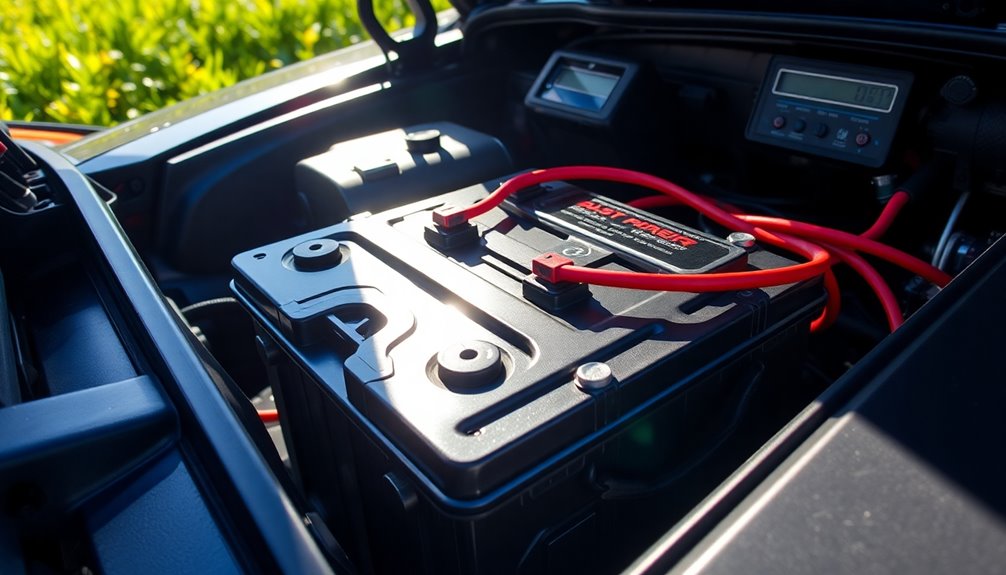Car batteries usually last around three to seven years, depending on the type. To maximize your battery life, avoid frequent short trips that prevent full charges. Monitor your battery's condition with a multimeter and keep terminals clean to prevent corrosion. Be mindful of temperature impacts—extreme cold can drain capacity, while heat can cause wear. Secure your battery to minimize vibrations and consider using a battery maintainer when parked for extended periods. Regular checks can save you headaches later. Keep exploring to uncover even more effective strategies for maintaining your car battery's health.
Key Takeaways
- Conventional lead-acid batteries last 3-5 years, while AGM batteries can last 5-7 years, and lithium-ion batteries in EVs may last up to 20 years.
- Frequent short trips hinder full recharges, which can shorten battery lifespan; aim for longer drives to maintain adequate charge.
- Extreme temperatures negatively impact battery performance—cold can reduce capacity by 30%, while heat accelerates corrosion and fluid evaporation.
- Regularly clean battery terminals and connections to prevent corrosion, and monitor battery condition using a multimeter for optimal maintenance.
- Test battery voltage annually; a fully charged battery should read around 12.6 volts or higher to ensure healthy performance.
Understanding Car Battery Lifespan
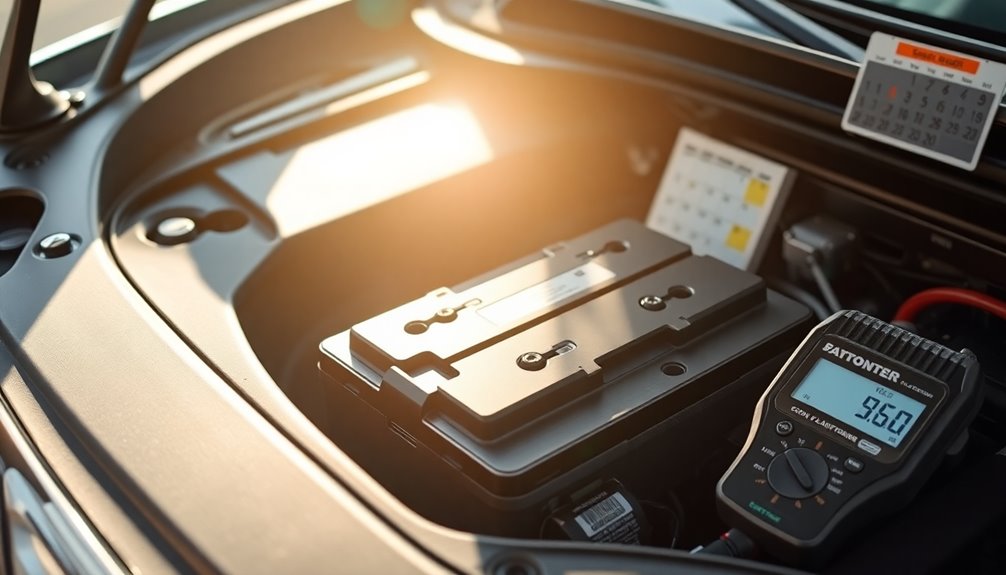
When you understand a car battery's lifespan, you can take steps to maximize its longevity.
Conventional lead-acid batteries last around 3 to 5 years, while AGM batteries can last 5 to 7 years. Lithium-ion batteries in electric vehicles may even last up to 20 years.
Your driving habits play an essential role; frequent short trips prevent full recharges, affecting battery lifespan. Environmental conditions also matter—extreme temperatures can accelerate wear.
Regular maintenance, like testing battery health and cleaning terminals to prevent corrosion, can greatly extend battery life.
Investing in quality batteries from reputable brands guarantees better performance and longevity.
Common Causes of Battery Failure

When it comes to battery failure, extreme weather conditions can take a serious toll on your car's performance.
You might also notice that corroded battery terminals and frequent short trips contribute to unexpected drain and inefficiency.
Understanding these common issues can help you take proactive steps to extend your battery's life.
Extreme Weather Conditions
Extreme weather conditions can wreak havoc on your car battery, leading to unexpected failures and costly replacements.
In extreme cold temperatures, chemical reactions within the battery slow down, reducing power output and increasing the risk of failure, especially below 32°F.
Conversely, hot weather accelerates corrosion and causes battery fluids to evaporate, damaging the battery structure and shortening its lifespan.
If you frequently drive in these harsh climates, your battery might last only three years in the heat compared to five years or more in cooler conditions.
To combat these effects, regular maintenance is essential.
Secure your battery and monitor its condition to help mitigate the impact of extreme weather on its performance and longevity.
Corroded Battery Terminals
Corroded battery terminals can be a major headache for drivers, as they often disrupt the electrical current and reduce battery efficiency.
You might notice a white or greenish powder on the terminals, indicating corrosion that can hinder charging and lead to battery problems. Common causes include moisture exposure, battery acid leaks, and natural aging.
To maintain ideal battery performance, regular cleaning is essential. You can clean corrosion using a simple baking soda solution, which helps prevent buildup and extends battery life.
Additionally, inspecting battery connections for corrosion and tightening any loose clamps can greatly enhance your battery's reliability.
Frequent Short Trips
Frequent short trips take a toll on your car battery, as these quick drives often prevent it from reaching a full charge.
When you drive for less than 20 minutes, your alternator may not recharge the battery effectively, leading to diminished battery health. This inadequate recharging can cause premature aging and a shorter battery life.
To emphasize the impact, consider these points:
- Short drives often lead to deeper discharges, weakening your battery.
- You're missing the chance for a complete recharge.
- Frequent short trips increase cumulative drain on your battery.
- Using a battery maintainer during long breaks can help.
Impact of Temperature on Batteries

Temperature plays an essential role in your car battery's performance and lifespan.
In cold weather, you might notice starting issues due to reduced chemical reactions, while heat can speed up evaporation and damage the battery's internals.
Understanding how to manage these temperature effects can help you keep your battery in top shape.
Cold Weather Effects
When winter arrives, it's important to recognize how cold weather can greatly impact your car battery's performance.
In extreme temperatures, your battery can lose about 30% of its capacity, making it harder to start your engine. Cold weather slows down the chemical reactions within the battery, reducing both performance and power output.
To maximize your battery life, consider these tips:
- Schedule regular maintenance checks to catch hidden issues.
- Use thermal covers to maintain battery efficiency.
- Keep your battery clean and terminals tight.
- Park your car in a garage or sheltered area when possible.
Heat Acceleration Factors
Cold weather isn't the only factor that can affect your car battery's performance; heat can be just as damaging, if not more so. High temperatures accelerate chemical reactions, leading to faster wear and a reduced lifespan. When your battery's exposed to heat above 80°F, it can cause electrolyte evaporation, compromising its internal structure and performance. This results in decreased capacity, making it harder to start your engine.
| Heat Impact | Effect on Lifespan | Performance Drop |
|---|---|---|
| High Temperatures | Decreased lifespan | Increased failure |
| Electrolyte Evaporation | Premature failure | Reduced efficiency |
| Extreme Conditions | 3-5 years to less | Less starting power |
Monitoring your battery during hot weather is essential to maximize its lifespan.
Temperature Management Strategies
To keep your car battery performing at its best, effective temperature management strategies are essential.
Extreme temperatures can take a toll on battery efficiency, so take these steps to protect your battery from environmental stress:
- Use thermal covers in cold temperatures to insulate against frigid air.
- Park in shaded areas to prevent overheating during hot temperatures.
- Regularly monitor battery performance to catch any issues before they escalate.
- Consider climate-controlled garages for ideal battery care.
Tips for Extending Battery Life
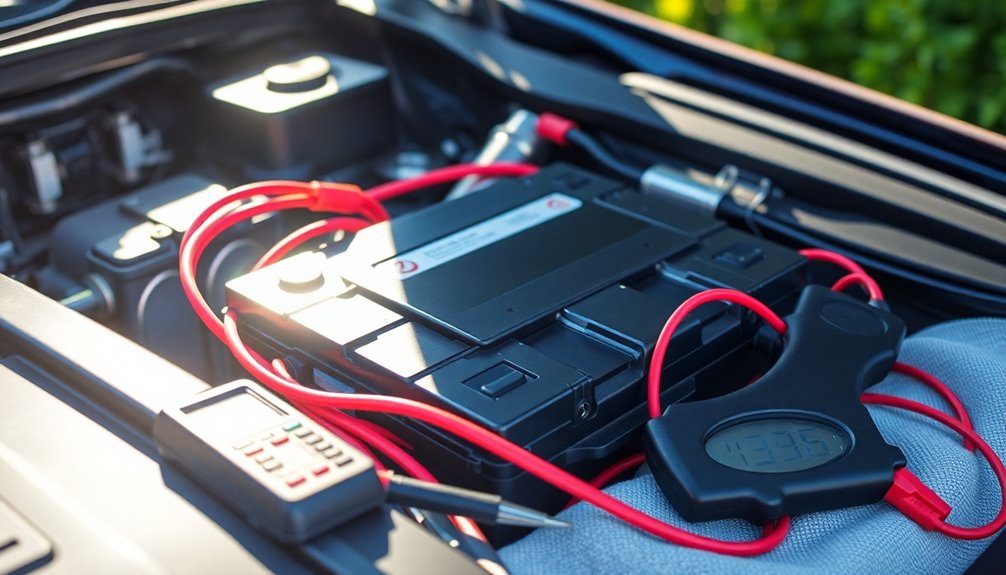
Maintaining your car battery's health is essential for ensuring it lasts as long as possible. To extend the life of your battery, regularly monitor its condition with a multimeter or professional tester. This way, you can check battery power and voltage levels for peak performance.
Minimize short trips, as they prevent the battery from fully charging; aim for longer drives instead. Keep your battery securely fastened to reduce vibrations that can damage internal components.
Additionally, clean battery terminals regularly using a baking soda solution to prevent corrosion, which can impede efficiency. If your car sits idle for long periods, consider using a battery maintainer to keep it charged without the risk of overcharging.
Importance of Regular Maintenance
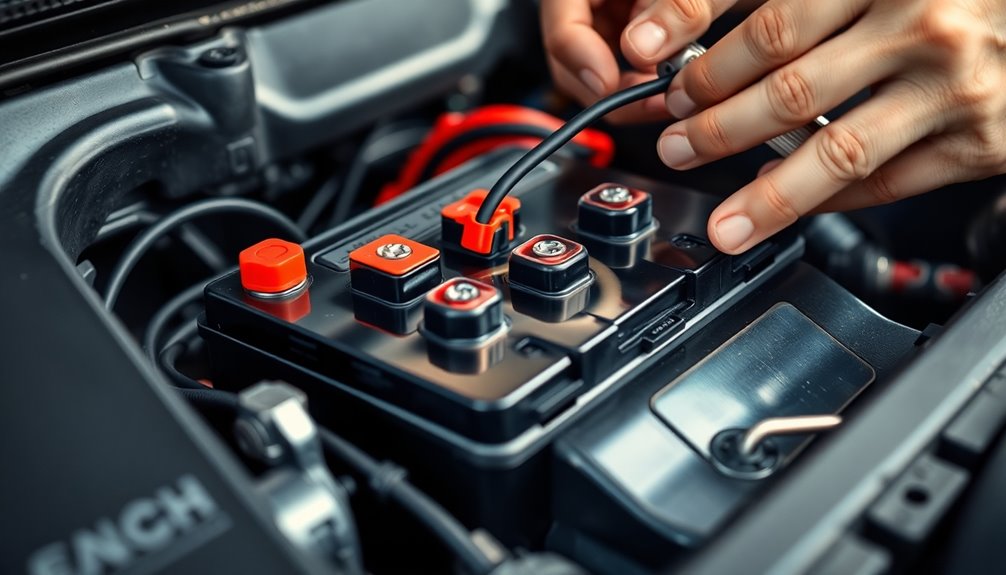
Regular maintenance of your car battery plays an essential role in maximizing its lifespan.
By keeping up with routine inspections and care, you can prevent unexpected failures and guarantee peak battery performance.
Here are four key maintenance tips to follow:
- Inspect battery terminals regularly for corrosion and secure connections.
- Clean terminals with a baking soda solution every few months to minimize corrosion buildup.
- Test the battery's voltage annually, especially after three years, to catch issues early.
- Use a battery maintainer during periods of inactivity to keep it charged without overcharging.
Recognizing Signs of Battery Issues

You need to pay attention to how your car starts.
If you notice a slow engine crank or see warning lights on your dashboard, it's a sign that your battery might be struggling.
Addressing these issues early can save you from more significant problems down the road.
Slow Engine Crank
When the engine struggles to turn over, it's often a sign that the battery is weak or nearing the end of its life.
You should pay attention to these key indicators of a slow engine crank:
- Frequent slow cranking, especially in warm conditions.
- Dashboard warning lights that may signal battery issues.
- Visual signs like corrosion on terminals.
- A swollen battery case, indicating potential damage.
If you notice any of these signs, your battery likely needs immediate attention.
Consistent slow starts—more than three times a week—can mean a battery replacement is on the horizon.
Don't wait until you're stranded; addressing these symptoms early can save you from unnecessary stress and inconvenience.
Dashboard Warning Lights
Three common dashboard warning lights can signal potential battery issues: the Battery/Charging lamp, the check engine light, and other related indicators.
If you notice the battery warning light dimming while idling, it often points to insufficient battery charge or charging system issues.
Additionally, if the check engine light appears alongside these warning lights, it may indicate a deeper electrical system problem that requires your attention.
Regularly monitoring dashboard warning lights is essential for identifying battery problems early, allowing for timely maintenance or replacement.
Ignoring these indicators can lead to severe battery failure, resulting in costly repairs or complete replacement.
Stay vigilant, and don't overlook those dashboard signals to keep your car running smoothly.
Best Practices for Battery Charging

How can you guarantee your car battery stays in peak condition? By following these best practices for battery charging, you can maximize your battery's lifespan and make certain it's always ready to go.
- Drive longer distances regularly to prevent short trips from draining your battery.
- Use a battery tender when storing your vehicle to keep it fully charged without overcharging.
- Monitor your battery voltage; a fully charged battery should read around 12.6 volts or higher.
- Avoid using electrical power when the engine's off to prevent parasitic draw.
Also, if you notice issues, check your charging system and alternator, as they're essential for maintaining your battery's health.
Your efforts will pay off in the long run!
Effective Corrosion Management
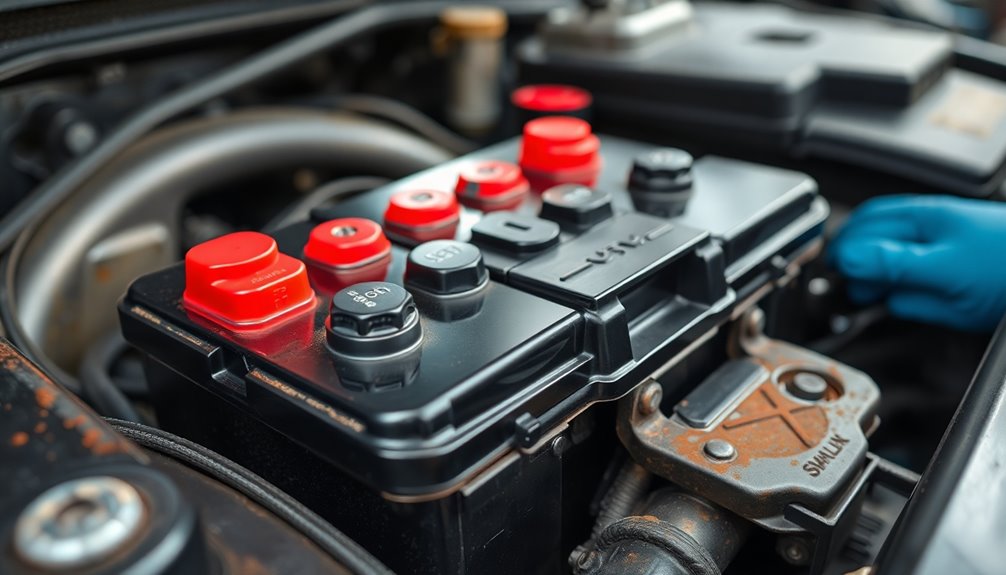
Although corrosion on battery terminals might seem minor, it can greatly impact your car's performance and battery life. This white or greenish powder disrupts electrical current, increasing resistance and reducing battery lifespan.
To effectively manage corrosion, regularly clean your battery terminals with a baking soda solution. Make it a habit to inspect battery connections for wear and damage at least once a month; this helps prevent corrosion buildup and guarantees reliable electrical flow.
After cleaning, applying a corrosion inhibitor spray can offer extra protection against future corrosion. Additionally, routine maintenance checks, including tightening any loose connections, can considerably minimize corrosion-related issues and extend your battery's life.
Taking these steps will keep your battery in ideal condition.
Choosing the Right Replacement Battery
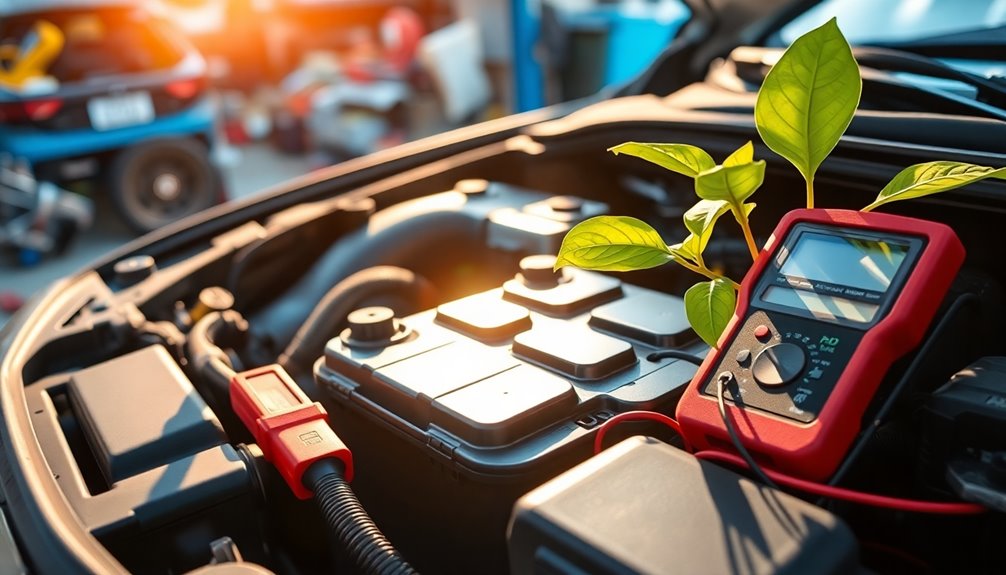
Maintaining your battery's health is just as important as knowing when to replace it. When choosing the right replacement battery, keep these key factors in mind:
- Battery Group: Confirm it matches your vehicle's original group number for proper fit.
- Cold Cranking Amps (CCA): Look for a rating that suits your climate, especially if you live in colder areas.
- Type of Battery: Decide between conventional lead-acid (3-5 years) or AGM batteries (up to 7 years) based on your needs.
- Quality and Warranty: Opt for reputable brands with extended warranties for reliability.
Additionally, understanding common issues can help you make informed decisions about battery maintenance and replacement.
Always consult your owner's manual or a mechanic to guarantee peak performance when selecting your replacement battery.
Emergency Preparedness and Assistance
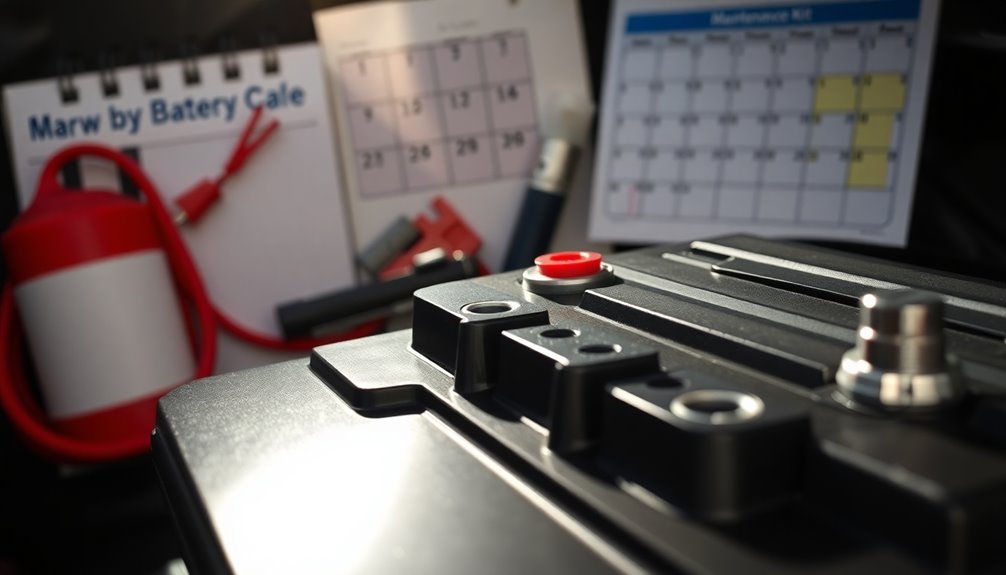
Being prepared for emergencies involving your car battery can save you time and stress on the road.
Consider joining a roadside assistance program like AAA, which offers battery jump-starts and replacements whenever you need help. Always keep a portable jump starter in your vehicle; it's a quick solution for dead batteries without waiting for another car.
Familiarize yourself with the proper jump-starting procedure to prevent damage to both vehicles. Regularly check your battery health and charge level to catch issues early.
Ultimately, create an emergency kit with essential items like jumper cables, a flashlight, and gloves. This way, you'll be ready for any battery-related incident, ensuring your safety and peace of mind.
Frequently Asked Questions
How Do I Prolong the Life of My Car Battery?
To prolong your car battery's life, start by testing its condition at least once a year.
Clean the terminals to prevent corrosion and secure your battery to avoid vibrations that can cause damage.
Try to avoid frequent short trips; longer drives help recharge the battery fully.
If you're storing your vehicle for a while, use a battery maintainer to keep the charge steady.
These simple steps can greatly extend your battery's lifespan.
What Drains the Car Battery the Most?
Your car battery's like a superhero, but even superheroes have kryptonite! The biggest drains include leaving lights on, which can zap power faster than you think.
Hidden electrical issues, like faulty stereos, sneakily consume energy too. Corroded or loose connections at the terminals can hinder recharging, while long parking periods without driving mean your battery's still working, albeit quietly.
Is It Bad if a Car Battery Tips Over?
Yes, it's bad if your car battery tips over.
When it does, internal damage can occur, leading to short circuits or leaks of harmful substances like sulfuric acid.
Even if your battery has sealed technology, it's still risky.
Always secure the battery properly in its compartment to avoid tipping during your drives.
If it does tip, inspect it for any damage or leaks and replace it if necessary to guarantee safety.
How Can I Maximize My Battery Life?
Picture a vibrant garden thriving under the sun, while a wilting flower struggles in the shade.
To maximize your battery life, regularly test its condition, ensuring it's healthy. Drive longer distances to fully recharge it, avoiding short trips that drain energy.
Secure it tightly to prevent vibrations from causing damage, and keep terminals clean to maintain efficiency.
Finally, use a battery maintainer during inactivity to keep its charge stable and strong.
Conclusion
To sum up, taking care of your car battery can really pay off. Did you know that a well-maintained battery can last up to six years? By following the tips we've discussed, like regular maintenance and managing corrosion, you can help guarantee your battery performs at its best. Remember, a little effort goes a long way in extending its lifespan, so stay proactive and keep your ride ready for the road ahead!

